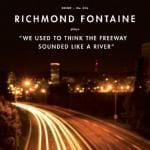
There are many analogues for Richmond Fontaine. Their almost-but-not-quite unhinged country sound and fondness for atmospherics are reminiscent of Wilco and pre-genre-hopping Ryan Adams. Lyricist, singer, and general mastermind Willy Vlautin’s tales of the drunk and down-and-out evoke Darkness-era Springsteen and American Music Club.
Inevitably, Richmond Fontaine are not quite as good on We Used to Think the Freeway Sounded Like a River, as that combination would suggest. While American Music Club’s Mark Eitzel tempers his songs about broken dreams or working class desperation with a measure of wit or compassion, Vlautin’s determination to make every story as depressing as humanly possible occasionally veers into self-parody. When “The Pull” starts out with a description of a boxer pulling his life together, your first reaction is to wonder how, exactly, things will go wrong. As if suffering from an obligation to end every song on a downer, Vlautin responds with a weirdly perfunctory tragic turn: “Detached his retina / In Fresno / Then they made him quit”. Melodies are in relatively short supply as well, mostly appearing in the form of an arc or cadence to Vlautin’s bleak recitations.
It must be said, though, that the problems mentioned above are the exception, rather than the rule. Vlautin, a published novelist, has sufficient command of the language to paint compelling portraits most of the time. “43” describes a man growing weed in his basement as the only way to make ends meet, awaiting and dreading his eventual downfall. The title track articulates the queasy loss of innocence a couple suffers after their house is burgled. Even tracks that aren’t compelling all the way through tend to have at least one moment of lyrical brilliance — witness the closing of “Ruby and Lou”:
What if the whole world is cursed? Ruby said, “It might be.” But since they were together, she knew they weren’t Lou said, “Maybe it’s just the west.” Ruby said, “It might be.” So for years they just kept heading east
When Richmond Fontaine are firing on all cylinders, the results are impressive. “You Can Move Back Here” is easily one of the best songs of the year. Vlautin’s narrator sounds like one of the town full of losers left behind in “Thunder Road”, begging someone to return from the big city. The ascending bass line and chiming guitars provide an optimistic contrast to the overall hopelessness of the case the song is making; there is no indication that the subject of the song actually wants to come back, other than that her voice sounds “shaky and weird” on the phone, and the narrator seems to know he has next to nothing to offer as enticement: “At least you’ll have the western sky / And me on your side”.
It’s no coincidence that this song is one of the most melodic on the record in addition to being the best — some conventional tunefulness makes it a lot easier to deal with the unrelenting nature of Vlautin’s imagery. This applies across the board — “Lonnie” and “Two Alone” are both highlights of the record, due at least in part to the presence of a powerful refrain. The same goes for the band as a whole. While there’s nothing wrong with the rock-inflected country music they provide throughout the album, extra touches like the mariachi horns on “The Boyfriends” or the crashing, tumbling drums on “43” make the record less monochromatic, resulting in some of the album’s best songs.
Richmond Fontaine are a bit unpredictable. When a song begins with a brushed acoustic guitar or vapor trail of pedal steel, it’s impossible to know if it’s going to develop into a moving character study or something stilted and pointlessly morbid. While this means that the best songs have a sense of discovery or surprise about them, it also means that the missteps carry the weight of genuine disappointment. As this is their ninth album, it’s unlikely that they’re going to change much at this point. A sustained masterpiece is unlikely. Instead, this is a record with only flashes of brilliance, but what flashes they are.

![Call for Papers: All Things Reconsidered [MUSIC] May-August 2024](https://www.popmatters.com/wp-content/uploads/2024/04/all-things-reconsidered-call-music-may-2024-720x380.jpg)



